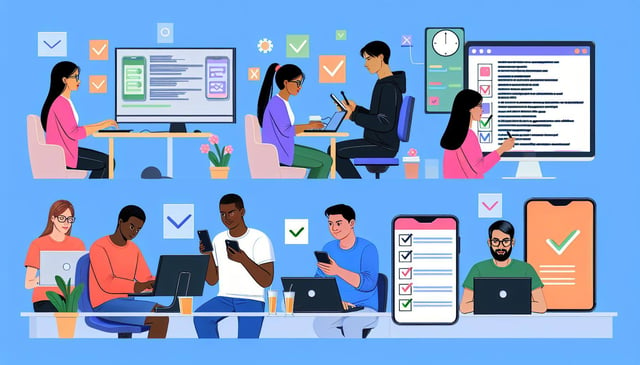

Thought Leader Q&A: Talking Validating Your Mobile App With Zach Whelchel
"
According to Statista, worldwide mobile app revenue is projected to hit over $580 billion this year. It’s no wonder why individuals, start-ups, and enterprises continue to strive to be the first to develop the next best new mobile app. In this thought leader Q&A, we discuss why validation is so important for that amazing mobile app idea in your head with Zach Whelchel, Mobile Architect at Callibrity.
Zach, can you please give our readers a quick overview of what validation means in the mobile app software space, and why it’s so important?
Absolutely. From the start-up world to larger enterprises, it seems as if everyone has an “app idea.” All ideas look good on paper, but few strike gold when the rubber meets the road. That’s why it is so important to get your idea in front of users as quickly as possible. Don’t let “great” be the enemy of “good.” Encourage your team to focus on limited functionality and ship an MVP. Provide value, gather feedback, and repeat.
Does rapid prototyping play a role?
Mobile is a great space for rapid prototyping. These days, people live on their phones. You’ll get more attention when you put your efforts in their pockets. Grabbing attention is really important in today’s fast paced market. I always say: “If you are going to fail, then fail fast.” Don’t assume your decisions behind closed doors are infallible. I’ve seen a lot of companies spend countless hours and resources “planning and designing” for months on end, without any real or actionable user feedback. That’s a recipe for disappointment and lost ROI. Start small and ship often.
Speaking of resources, are there any “tried-and-true” basic validation steps that can be taken?
“Premature optimization is the root of all evil.” One area I’ve seen this out in the mobile development space time and again is in the need to make the “everything” app. Ambitious PMs may think to themselves that they’re going to launch on all devices, all operating systems, to all users – right out of the gate. In some cases this may be necessary, but more often you can move quicker. iOS users are a smaller global share (when compared to Android users), but they account for significantly more money spent in apps. For this reason, I recommend validating new app ideas with a native iOS app.
You mentioned MVP, or “Minimum Viable Product.” That is a product with enough features to attract early-adopter customers and validate the product idea early enough in the product development cycle. Why is mobile so uniquely positioned for quick MVP creation and validation?
The top mobile platforms provide all the bells and whistles you need right out of the box. There’s no need to over complicate things by creating your own design system – especially when these platforms already enable you to get to market very quickly. The same is true with your user interfaces. iOS users have put a lot of effort into learning how an iOS experience feels. This is also true for Android. Stick with the components included in the box and you’ll be 90% of the way there.
You mentioned the importance of avoiding premature optimization. Are there any other common pitfalls you’ve encountered with the validation, creation, and development of mobile apps?
Premature optimization is definitely the most common issue. It’s so easy to allow the excitement of an idea to take over and lead developers and product folks into getting too far ahead of themselves, or too far into the weeds in terms of what could be built, and what it will look like.
To avoid building systems that are ready for a future that may never arrive, my advice is just build for what is in front of you, get it out there, and validate it – and if the market fits and there are people who need it – there’s always going to be the allocation to make it better in the future.
Great advice. Do you have your own mobile-app validation mantra that you’d like people to hear?
Definitely. I call it “following the loop between intuition and data.” In other words, with any decision you have to make about how to build, or which features to include, you would ideally start with data that proves customers want it.
But in the absence of data, when you want to get the app out there quickly, it's appropriate to go with your intuition – especially if it’s telling you that users are going to want a feature built a particular way. By all means, go with your intuition, as long as you make sure you're putting tools in place that can grab data later to eventually inform the loop and keep it going. Following this “Intuition-> Data Loop” can be a great way to grow a product.
You’ve talked a lot about the importance of iteration; what tools or resources can help accelerate that process?
I can think of three. There's a tool called Amplitude which helps you easily create funnels that enable you to log custom events inside your app. By creating funnels on the back end you can see where people fall off, so it’s something I use whenever I create a new app. I like being able to identify where fall offs are happening and then start to A/B test at that point.
Firebase has a built-in A/B testing suite that makes it really easy to set up a percentage of your users for testing, then you can quickly switch everybody over to the best performing option.
Revenue Cat is a preferred partner with us here at Callibrity and it is another one of those tools that helps you quickly A/B test with a focus on in-app subscriptions. It’s especially great for start-ups trying to decide on a pricing model.
I’m sure a lot of people reading this might be among those who believe they have a great idea for an app. How can Callibrity help bring it to life?
We have a lot of native mobile expertise here at Callibrity. It’s a core strength. Members of our team have worked across the board from start-ups to big enterprises. So we bring a lot of expertise, but I'd add that one thing that truly makes us different is that we are not only good at developing the app, we're also good at the ideation along the way. We love to jump in at that early stage and unpack the idea and ideate around it. Look at it from different angles . . . determine how best to quickly get something for people to iterate on. Callibrity is well-versed in everything from the idea to the design. We love to dream together with our clients about what things could become. And then, of course, the execution that takes it from a dream to reality in the quickest way possible. If we prove the viability, we can pivot toward scaling up to really take it to market in a big way.
We appreciate Zach Whelchel taking the time to participate in our Q&A and for sharing his expertise. His passion for Callibrity’s ability to span the entire app validation process from dreaming to implementation and ramping up in taking it to market is obvious. You can read more about Callibrity here: https://www.callibrity.com/about-us